Salut Les parents!
May this Passover bring you and your family peace,joy,and meaningful moments together. Your children worked beautifully on all the activities and when asked why they like Pessah, here are their answers:
Guided By Our North Stars
Salut Les parents!
May this Passover bring you and your family peace,joy,and meaningful moments together. Your children worked beautifully on all the activities and when asked why they like Pessah, here are their answers:
Salut chers parents!
During La Semaine de la Francophonie, the kids had a blast participating in activities like playing bingo and practicing ordering in French at the restaurant “oui oui baguette” They enjoyed the fun, interactive ways to learn the language. Additionally, through songs, games,reading buddies and various videos they learnt so many new words associated with protecting the planet. The combination of language learning and environmental awareness made the week both educational and enjoyable for everyone! Listening to them say their lines in French so clearly and fluently melted my heart! Bravo le amis! I am so so proud of all the progress you have made.
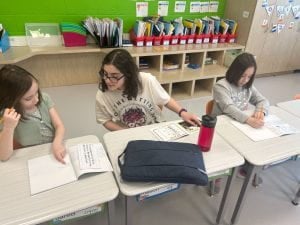
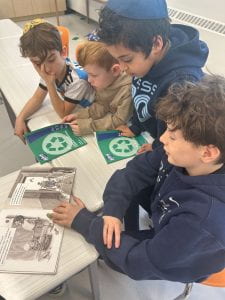
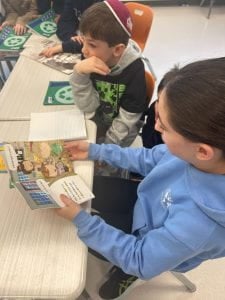
Dear Parents,
Purim in our classroom was a joyful and exciting celebration filled with creativity, learning, and laughter! We explored the story of Purim through Megillat Esther, practiced reading and writing with fun Purim-themed vocabulary activities, exchanged Mishloachei Manot,
and even baked delicious hamantaschen.
To wrap up our celebrations, we read The Egg That Disguised Itself (known in Hebrew as “הביצה שהתחפשה”, a delightful story about an egg that didn’t want to remain just an egg. Inspired by this charming tale, each student designed their own unique “egg character,” wrote about it, and proudly shared their creation with the class.
This activity sparked incredible creativity and imagination, making our Purim celebrations even more special. What a wonderful and festive time we had!
Last week we celebrated a big milestone:we have completed 100 days of school! Since the beginning of the year, we have learnt so much -reading and writing in French,counting,reading comprehension and much more. We have also grown together,sharing laughter and great achievements.
Congratulations to everyone for your hard work and perseverance! Let’s keep learning with enthusiasm in the days to come. Now enjoy the kids counting to 100 and reciting a little poem about the 100 days of school.
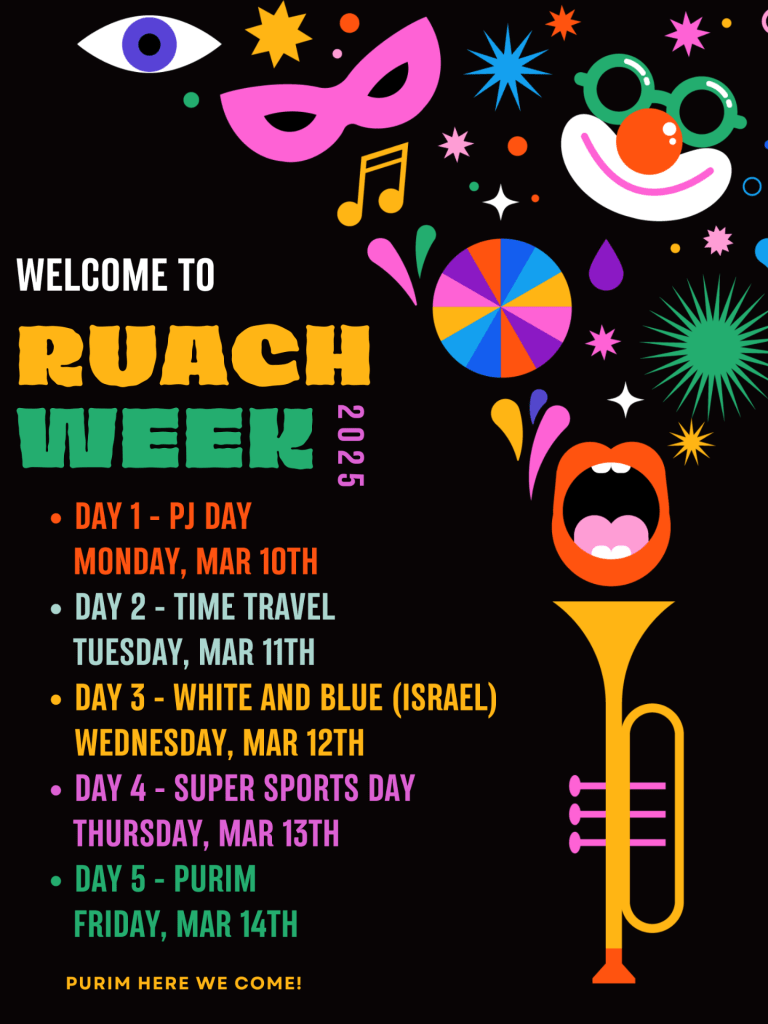
On Wednesday, our Grade 1 and 2 students came together to celebrate Tu B’Shevat, the New Year for Trees! It was a wonderful day of learning, discovery, and appreciation for nature.
The children enjoyed listening to stories about trees, learning how they grow and why they are so important. They also got their hands dirty planting seeds, a perfect way to connect with the holiday’s theme of renewal and growth. We thank Moreh Liad from SK for teaching us about planting and bringing us so many seeds to plant.
In the classroom, students worked on Hebrew and French activities related to Tu B’Shevat, strengthening their language skills while deepening their understanding of the holiday. They worked on puzzles, practiced unscrambling sentences and completed tree-themed word searches, making learning fun and engaging. In French, they explored the names of native trees in Canada, the parts of a tree, and different leaf colours.
They also took part in a fascinating discussion comparing trees in Israel and Canada at this time of year. While Canadian trees stand bare in the winter cold, many trees in Israel, like the almond tree (Shakdia), are already beginning to bloom! The students reviewed their colours in French by learning what colour.
To end the celebration on a joyful note, the children gathered together to sing songs and do tree yoga an in honour of Tu B’Shevat. Their voices filled the room with warmth, reminding us all of the beauty and importance of nature.
Tu B’Shevat was a meaningful and engaging experience for our young learners, helping them deepen their appreciation for the environment and the world around them. Ask your child about their favourite part of the celebration—we’d love to hear their thoughts!
Our kiddos are looking forward to the break. They have every reason to be excited since they have been working hard in class. Students are trying to master the French language in every possible way. The stories they are writing are mind-blowing. Not only do they know the vocabulary, but their confidence has increased considerably, since they have been challenging themselves (writing a story using verbs other than etre and avoir). Confidence is the number one predictor of academic achievement. We will continue with more writing and more presentations after the break on different topics. We have finished with winter vocabulary and we are currently learning the meaning of different verbs. It’s time they put all this knowledge (vocabulary and verbs like porter,manger,boire,jouer,faire,aimer etc )into practice. As far as reading is concerned, we keep practicing the complex sounds. The kids need to practice “Je lis” regularly to remember the sounds and improve their fluency. The point is to move to a different level, but only once they have read the books correctly. That’s why you should advise them to listen to the story many times before recording especially when it comes to some tricky or new words. During the break, try to expose them to the French language as much as possible, visit museums, watch their favorite show like Minecraft, Pokémon, Barbapapa, Scooby-Doo, Ben 10 in french, listen to french songs, and use free online Apps like Duolingo, Hello- World French Children’s Activities can all make this journey for the kids educational and fun. Enjoy the videos with Lev B, Jacob C, Zach and Ilana.
In the Know
As we approach the end of the first term here is a snapshot of what we have been doing in every subject.
Language Arts:
Novel Studies-Our Grade 2 students have begun working on their first Novel Study. There are two different Novel Study groups depending on where they are at in their learning journey. We are reading books by Judy Blume, Freckle Juice and Tales of a Fourth Grade Nothing.


Writing Conventions – We continue to work on understanding that a proper noun is always capitalized and that each sentence starts with a capital and ends with punctuation. Can they spot the error? They have been given many opportunities to spot the missing punctuation and capitalization of words in a sentence as they complete Read it, Fix it Write it.

Opinion Writing- The students have been working on being able to write an opinion piece, they reference the rubric provided in order to ensure they have done their personal best.
| Criteria | 4 – Excellent | 3 – Good | 2 – Satisfactory | 1 – Needs Improvement |
| Opinion Statement | The opinion is clearly stated and easy to understand. | The opinion is clear but may need some clarification. | The opinion is stated but is unclear or not fully formed. | There is no clear opinion, or it is hard to understand. |
| Supporting Reasons | Provides 2 or more strong reasons to support the opinion. | Provides 1 or 2 reasons that support the opinion. | Gives 1 reason that partially supports the opinion. | Does not provide reasons or the reasons do not support the opinion. |
| Organization | Writing is well-organized with a clear beginning, middle, and end. | Writing is organized with a beginning, middle, and end, but may be a bit unclear. | Organization is present, but may be difficult to follow. | Writing lacks organization and is hard to follow. |
| Details and Examples | Includes specific details and examples to explain the opinion. | Includes some details or examples to explain the opinion. | Provides few details or examples, or they are unclear. | No details or examples are given to explain the opinion. |
| Conclusion | The piece ends with a strong, clear conclusion that wraps up the opinion. | The piece ends with a conclusion, but it may be weak or unclear. | There is a conclusion, but it does not tie up the opinion clearly. | No clear conclusion is provided. |
| Grammar and Spelling | Few or no errors in grammar, punctuation, or spelling. | Some errors in grammar, punctuation, or spelling, but they do not make the piece hard to read. | Some errors in grammar, punctuation, or spelling that make the piece hard to read. | Many errors in grammar, punctuation, or spelling that make the piece difficult to read. |

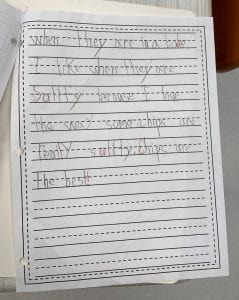
Our students continue to be introduced to the Structure Word Inquiry spelling rules. Familiarizing themselves with these spelling rules (posted on our boards) allows them to edit their own work. They are also encouraged to use their dictionaries for high frequency words such as (i.e,because, was and want).
Note: / / = sound letter makes < > = letter name
When should we use <ch> and when should we use <tch> at the end of a monosyllable word? If a /ch/ follows a short vowel use <tch>. If a /ch/ follows a consonant or a long vowel team use <ch>.
2. FLoSZ RULE
The letters <f>, <l>, <s> and <z> double at the end of a one syllable word if they immediately follow a short vowel.
3. Puck in the Rink Rule
If /k/ follows a short vowel use <ck>.
If /k/ sound follows a consonant or two vowels, use <k>.
4. Huge Bar of Fudge Rule
If /j/ follows a short vowel use <dge>. If /j/ follows a consonant or a long vowel team use <ge>.
Author Study-Each month we explore yet another collection of books during our author study. The students have a scheduled library period where Brigitte (our librarian) introduces a new author and reads books from their collection. We then bring them to our classroom to use during transition times and our literacy blocks. This past month Ms Brigitte read books from the Read Aloud Picture Book Study (author William Steig).

Workshops-We participated in our first Grade 2 workshop entitled Digital Tracks. The students watched a video followed by a class discussion on how tracks always remain online.



Here is the link to the video on Digital Tracks
Science:
We have completed our unit on Movement and Simple Machines. Our Grade 2 students did a great job working in pairs and designed a pulley able to lift water from the well (bucket). They then reflected on their experience and what they might do differently next time. The students did an excellent job completing several quizzes as artifacts of their knowledge.





We began our unit on Liquids, Solids and Gases by completing a workshop at the Science and Technology Museum. What a fun way to start a new unit.

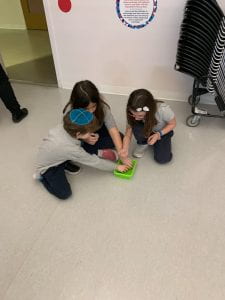

Social Studies:
Our Grade 2 class compared birthday traditions and celebrations among diverse groups and can identify some of the reasons for changes in these traditions/celebrations. They are starting to become familiar with the social studies inquiry process as they investigated some of the past and present traditions and celebrations within their own family. Each child completed their Chanukah traditions project where they compared ways in which some traditions have been celebrated over multiple generations in their family.

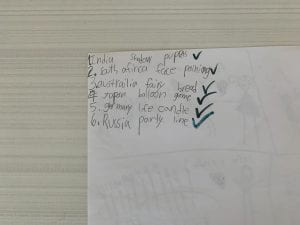

Math:
Problem Solving-The focus has been working on 2 step problems. The emphasis has been reading for understanding and showing your work. One of our North Stars is we learn better together, so showing how we got our answer helps others see that there is more than one way to solve a problem.
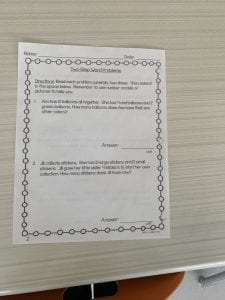

Numbers:
We worked on balancing equations and math fact families. It is very important that the students understand the relationship within each family. This understanding helps with their math fact fluency. Some have been introduced to addition and subtraction double digits regrouping and borrowing. They continue to work on using these skills when solving 2-step word problems.
Monday, January 20, 2025
Dear Parents
We’re excited to share that your child is bringing home their login information for Boost Reading. This innovative online reading program aligns with the Amplify assessment program we use at school. Boost Reading is the licensed literacy acceleration and remediation program we’ve selected for our K-5 students, designed to enhance their learning experience.
This engaging program uses adaptive technology to provide personalized learning tailored to each student’s needs. Authored by experts in literacy, cognitive science, and instructional design, Boost Reading is built on proven teaching methods and incorporates the latest research on how students learn to read.
At school, your child will use Boost Reading about once a week in class.
We encourage students to continue their Boost Reading journey at home. Starting today, Boost Reading will also be our regular reading homework once a week. Encourage your child to have fun and do their best, but please refrain from assisting them during this process. Your child must complete any activities independently for accurate personalisation.
Boost Reading offers a fun and effective way to support your child’s literacy development. We look forward to seeing the progress they’ll make with this valuable tool!
Please click on this Amplify/Boost link then click on the scan button and use the QR code located in your child’s purple folder.
If you have any questions, don’t hesitate to reach out.
Kind regards,
Morah Ann-Lynn
Today was a terrific day at school as we came together to celebrate the Hebrew language and its rich history. Kitah Alef and Bet gathered for a special morning dedicated to learning about Eliezer Ben-Yehuda, the founder of modern-day Hebrew.
Morah Ada and Morah Dana talked about Eliezer Ben-Yehuda’s incredible vision and determination to revive Hebrew as a spoken language. The children learned how his efforts transformed Hebrew from a language primarily used in religious texts into a vibrant, everyday language spoken by millions today.
To deepen their connection to Hebrew, the students participated in a variety of fun and educational activities. There were word searches that challenged them to find hidden Hebrew words, word-picture matching games that helped them build their vocabulary, and puzzles that encouraged teamwork and problem-solving—all in Hebrew, of course! The room buzzed with energy and enthusiasm as the children immersed themselves in these interactive tasks.
The morning wasn’t just about learning; it was also about fostering a sense of respect for the Hebrew language. Laughter and excitement filled the air as students proudly showcased their completed activities and shared what they had learned with one another. #We Learn Better Together.
By the end of the celebration, the children had not only gained new insights into the history and importance of Hebrew but also strengthened their connection to it through meaningful, hands-on experiences. It was a beautiful reminder of how language can unite and inspire us, and how even our youngest learners can play a role in carrying forward this legacy.
Kol Hakavod to our students for their enthusiasm and participation. Together, we celebrated not just a language, but a vibrant part of our heritage and identity.